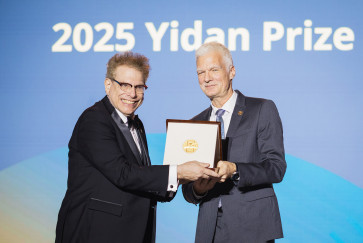Northwestern University professors Shana Kelley, Dr. Dimitri Krainc and Hooman Mohseni have been named 2023 fellows of the National Academy of Inventors (NAI).
NAI fellow status is the highest professional distinction awarded solely to academic inventors. The program recognizes academic inventors who have demonstrated a “spirit of innovation” by creating or facilitating inventions that have made a tangible impact on quality of life, economic development and social welfare.
Kelley, Krainc and Mohseni are among 162 new fellows in the 2023 class, which represents 118 research universities and governmental and nonprofit research institutions worldwide. The 2023 class collectively holds more than 4,600 issued U.S. patents.
The 2023 class of fellows will be honored and presented their medals by a senior official of the United States Patent and Trademark Office at the NAI 13th Annual Meeting on June 18, 2024.
Shana Kelley

Kelley is the Neena B. Schwartz Professor of Chemistry and Biomedical Engineering at Weinberg College of Arts and Sciences and the McCormick School of Engineering, professor of biochemistry and molecular genetics at Northwestern University Feinberg School of Medicine and president of the Chan Zuckerberg Biohub Chicago.
The Kelley laboratories develop new bioanalytical technologies for measuring molecules and cells with high levels of sensitivity and precision. The work has resulted in the development of new diagnostic tools as well as therapeutic approaches.
“I am incredibly honored to be recognized by the National Academy of Inventors and am very appreciative for the efforts of past and present team members who have contributed to our efforts,” Kelley said.
Kelley is the founder of four life sciences startups (GeneOhm Sciences, acquired by Becton Dickinson; Xagenic Inc., acquired by General Atomics; Arma Biosciences, founded in 2020; and CTRL Therapeutics, founded in 2022. She is an inventor on more than 50 patents. Kelley is a member of the American Academy of Arts and Sciences, a fellow of the American Institute for Medical and Biological Engineering, a Guggenheim fellow and a fellow of the Royal Society of Canada.
Dimitri Krainc

Krainc is chair and Aaron Montgomery Ward Professor of the Davee Department of Neurology and director of the Simpson Querrey Center for Neurogenetics at Feinberg.
Krainc was selected as a fellow based on his groundbreaking research in the field of neurodegenerative disorders, which has resulted in more than 30 patents for innovative therapies targeting Huntington’s and Parkinson’s diseases.
“It’s an honor and a privilege to join such an esteemed group of inventors across different fields of science and technology,” Krainc said. “I am grateful to the many wonderful colleagues, trainees and collaborators I have worked with over the years. This recognition is a tribute to them as well.”
Krainc’s research focuses on defining key molecular pathways in the pathogenesis of neurodegeneration with a goal of uncovering targets for therapeutic development. His group’s work highlights the importance of studying human neurons in the pathogenesis of neurodegenerative disorders. The Krainc laboratory has developed targeted therapeutic approaches for Parkinson’s disease that are currently in clinical trials.
Based on his discoveries, Krainc founded two biotech companies, including Vanqua Bio in Chicago. His contributions to the field have been recognized by many awards and distinctions, including a National Institutes of Health Outstanding Investigator Award and the Javits Neuroscience Investigator Award. Krainc is an elected member of the National Academy of Medicine and the Association of American Physicians, and he serves as president-elect of the American Neurological Association.
Hooman Mohseni

Mohseni is AT&T Chair Professor of Electrical and Computer Engineering at McCormick and a professor of physics and astronomy (by courtesy) at Weinberg College. He is a member of the Center for Interdisciplinary Exploration and Research in Astrophysics (CIERA).
Mohseni’s research focuses on building groundbreaking devices and systems based on quantum physics, microelectronics and novel methods of heterogeneous integration of dissimilar material to create new functionalities. Mohseni is internationally recognized for his research and inventions in the emergent field of nanoscale semiconductor optoelectronic devices.
“I am humbled by this recognition,” Mohseni said. “Pushing the frontiers of science and technology has been more than a personal quest; it has been a means to address challenges and make meaningful contributions, driven by a sincere desire to positively impact the world around me. I am deeply grateful for the privilege of collaborating with outstanding mentors, colleagues and students who have been instrumental in shaping my journey. Working with them has been invaluable in tackling tough challenges. I am eagerly looking forward to our ongoing projects and anticipate exciting new discoveries.”
Mohseni’s research addresses a wide range of applications, including noninvasive biomedical imaging, augmented reality, brain-machine interface, and astronomy. He has been involved in several startups, as co-founder, CEO and CTO. Mohseni holds more than 33 U.S. patents and 11 foreign-issued patents and has 51 patents pending. His honors include the W.M. Keck Foundation Award, DARPA Young Faculty Award and the NSF CAREER Award. He has published 275 articles and eight book chapters. Mohseni is a fellow of SPIE and Optica.


